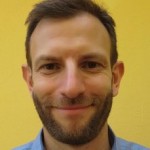 Written by Andy Paice for Enlivening Edge.
Written by Andy Paice for Enlivening Edge.
With corporations under severe scrutiny for their role in the unfolding global environmental and social crises and workplaces full of disengaged human beings burdened by soulless work, there are however signs of heartening green shoots that have the potential to transform business and society.
Over the past 6 weeks I have been fortunate to find myself involved in a seamless confluence of 2 responses to the current malaises of 21st century organisations.
As a Coach, Facilitator and Mindfulness trainer and member of Impact Hub Kings Cross in London, I was asked to help host its U.Lab: Transforming Business, Society, and Self course. The Presencing Institute (an awareness-based action-research community) and the Impact Hub network (of social enterprise co-worker spaces) have formed a partnership to bring the U.Lab online course into hubs of collective study and exploration in over 42 Impact Hubs around the globe. The idea behind this is to create in-person communities as well as an online global movement that can “build a new economy by co-sensing and co-creating the emerging future.”
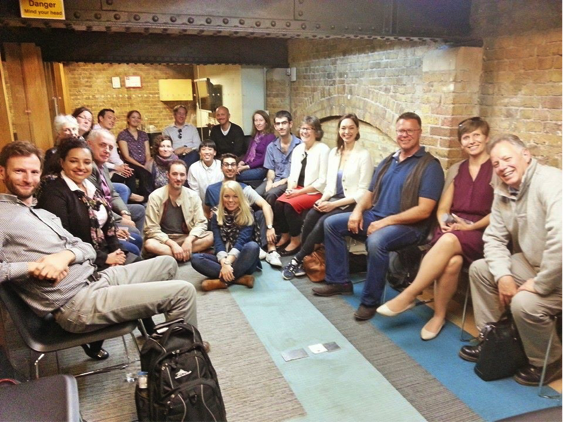
Being immersed in the U.Lab course, meeting in person weekly with a local community of changemakers, whilst being connected online through course material and livestream broadcasts to 40000 participants from every corner of the globe has felt like a glimpse into an amazing future for our planet.
This combined with being involved with the London Teal Community of Practice that has evolved out of Frederic Laloux’s work on “Organizations Inspired by the Next Stage in Human Consciousness” has provided an incredible backdrop for insights concerning organisational and systemic change that I’d love to share with you here.
The first major message vectored by both Theory U and the Teal organisational perspective is that it’s our level of consciousness that creates either systems of wellbeing or malaise. It all starts with the way we use our human awareness.
In U.Lab we’ve been seeing how downloading – operating from preformed judgments and out-dated assumptions about any given personal, organisational or societal situation creates a disconnect between our perceptions, actions and the actual reality of a situation. The results of this are the Ecological, Social and Spiritual divides seen in the world today and described in Otto Scharmer’s work.
Now I’m sure if you read the paragraph above you’ll understand how operating from preformed ideas rather than from what’s really happening could be problematic in any context. And I, as an ex-Buddhist monastic, having spent years doing self and group awareness practices, was under the impression I did too!
But the eye-opening surprise that the U.Lab course has brought me so far is in revealing the extent to which we are downloading most of the time. Through listening assessment exercises, stakeholder interviews and particularly group coaching circles with case studies, one gets to appreciate just how limiting our individual perspectives are.
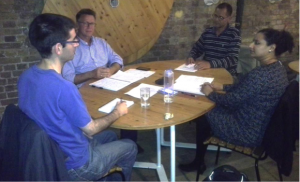
Through heart centred meditative practices that are integral elements of the peer coaching circles, collectively intelligent and wise thinking processes emerge. In last week’s U.Lab here in London the person presenting his case clinic was able to receive feedback that shifted not only his thinking about how to communicate regarding his social enterprise, but enabled us all to come out of it with new insights. For myself I understood that upgrading our organisational systems is not merely a logistical or technological issue. Instead it requires a shift to deeper level of attention that creates an authentic and nourishing human connection. By lifting these conceptual barriers (imposed by projections of role, class, sex or function) we are able to think collectively. This is what Theory U describes as the shift from Ego to Ecosystem awareness. From this perspective we can create enterprises and institutions founded on actions where everyone wins.
My involvement in the Teal Community of Practice for “Reinventing Organizations” has revealed how deeply complementary the Theory U and Teal approaches are. The former provides a toolkit of self and collective development practices whilst the latter looks at the patterns shared by organisations that are already demonstrating elements operating from “next stage of human consciousness.” U.Lab helps us to travel from A to B, whilst Teal describes what B already does or can look like.
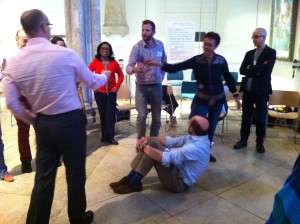
The patterns identified by Laloux in what he terms as Teal organisations provide a sustainable solution to disengagement by promoting a culture of self-management where teams themselves rather than a management hierarchy co-create a purpose-led work environment that can respond quickly and effectively to challenges.
Further breakthroughs of organisations operating at the level of Teal are: an appreciation for wholeness in which employees are able to bring all of who they are to work and an acknowledgment of evolutionary purpose where the organisation is seen as a living being with a life and a sense of direction of its own.
In order to follow this evolutionary purpose the role of its members is to listen to what it wants to become via large group session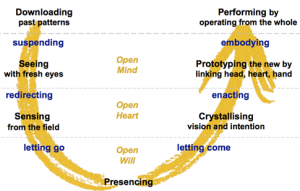 s and meditation practices. Although this may appear unusual in today’s mainstream business world such practices are proving successful for a number of thriving, cutting edge organisations. Indeed U.Lab mirrors this in encouraging the similar practices of getting quiet and ‘letting come’ – waiting for what wants to emerge in order to create new prototypes based on inspiration and intuition. This is seen as a way to create structures that are robustly aligned to the deeper realities of a given situation.
s and meditation practices. Although this may appear unusual in today’s mainstream business world such practices are proving successful for a number of thriving, cutting edge organisations. Indeed U.Lab mirrors this in encouraging the similar practices of getting quiet and ‘letting come’ – waiting for what wants to emerge in order to create new prototypes based on inspiration and intuition. This is seen as a way to create structures that are robustly aligned to the deeper realities of a given situation.
Both the U.Lab course and Teal community are forging, for myself and a growing number of others, a journey of self-discovery within the context of organisational and systemic structures. Both create an impulse to move us from our blinkered individual perspectives into dealing with problems and finding solutions from the level of systems themselves. By freeing and enlivening the individual players through presence and authenticity our organisations become self-cognisant and thus able to evolve in ways that benefit everyone. The fact that U.Lab and Teal organisations are now capturing the imagination of so many around the globe gives me hope for our future!
Andy Paice is a London based Coach, Facilitator, Mindfulness Trainer and Community Builder.
Twitter @andypaice Website andypaice.net
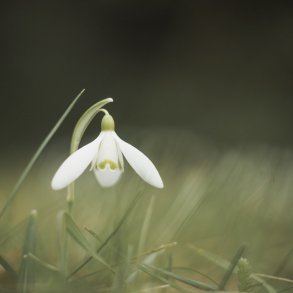


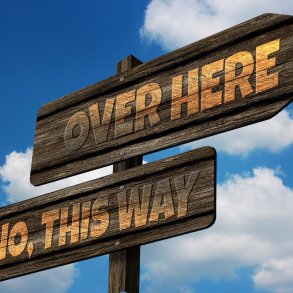
Hi Andy. I’m delighted you’re facilitating U.Lab at Kings Cross because I’m on the MOOC too and in a learning circle at Hub Westminster – more things coming together.
BTW I notice holacracy featuring strongly in the tag cloud here. Is is an interest of yours? There is a holacracy event tomorrow evening and it seems it is still possible to join – http://www.meetup.com/ResponsiveLeaders-London-Our-first-meetup/events/224761666/
Hi Pamela,
Great that your on the ULab course too! I am interested in holacracy and it probably features strongly for the web cloud of the EE site in general. Unfortunately I won’t be able to make it to the event tonight. Have fun!
Reading your inspiring article, I feel gratitude to all those who had the foresight to create and use impact hubs around the world as spaces where emergence is not only welcomed but consciously enabled. It feels like different nodes start connecting the hearts, minds and will of people around the world through whom the next level of consciousness and operating in this world is being birthed and practised right in the middle of the old system. How can we provide more and more practice opportunities to attract the hearts and minds of all those who want to be real, whole and fully present to what’s happening?
Thank you Anna. Yes the Impact Hub – Presencing Institute partnership has been amazing for this U.Lab Mooc. Feels like there is a really high level of engagement in the IH ULab hubs all over the world.
And great question Anna. I think one element that could be contagious is the peer coaching circles. As I’m experiencing with my group it helps people go straight to the heart of the issues they are working on and creates a community of mutual support. Our coaching circle is already talking about continuing to meet up after the course has finished. People just need a place to meet in relative quiet and this process can be scaled up with relative ease.
Andy, Love your synthesis of these two threads. I’m an integralist, a fan of Laloux’s work, and helped launch the U.Lab @ Impact Hub initiative. I’d love to learn more about your Teal Organizations group – care to have a cup of tea over skype sometime?
Hi Lisa. Thanks. I’m glad you found it interesting. It would be great to have a tea and skype chat. I’d be interested in hearing your experience of U.Lab.How about next week?
Regarding Teal groups this article https://enliveningedge.org/tools-practices/starting-a-teal-meetup/ might be of interest to you.
Andy. Thanks for introducing me to Teal. I had no idea what it was until I read and replied to your post a couple of days ago.
Then yesterday I was at http://www.meetup.com/ResponsiveLeaders-London-Our-first-meetup/events/224761666/ and it was referred to in the opening remarks. If I hadn’t have read your post I would have had no idea about the reference. As it was my interest was immediately attracted and I took notice.
Today I was at a ResonsiveOrg meeting which I booked a while back, before I knew anything about Teal http://www.meetup.com/ResponsiveOrg-London-UK/events/225232198/?a=me1_grp&rv=me1&_af=event&_af_eid=225232198&https=off People were sharing experiences about organisations with reference to colours (mainly red and orange ) and to hear those Teal references used in context was enlightening. Teal seems to be everywhere. Thanks for the introduction.
Pamela, yes I’m also surprised how succesfully the concept is taking off. The developmental and values levels having different colours is something that Frederic Laloux has used that originates in Spiral Dynamics and has been developed by Integral Theory https://integrallife.com/integral-post/overview-integral-theory